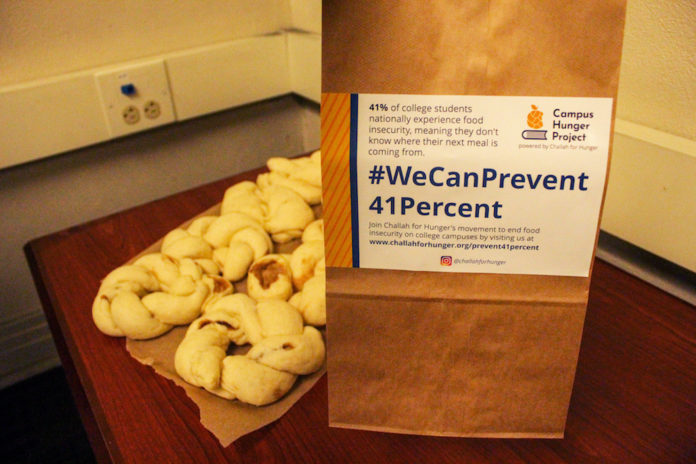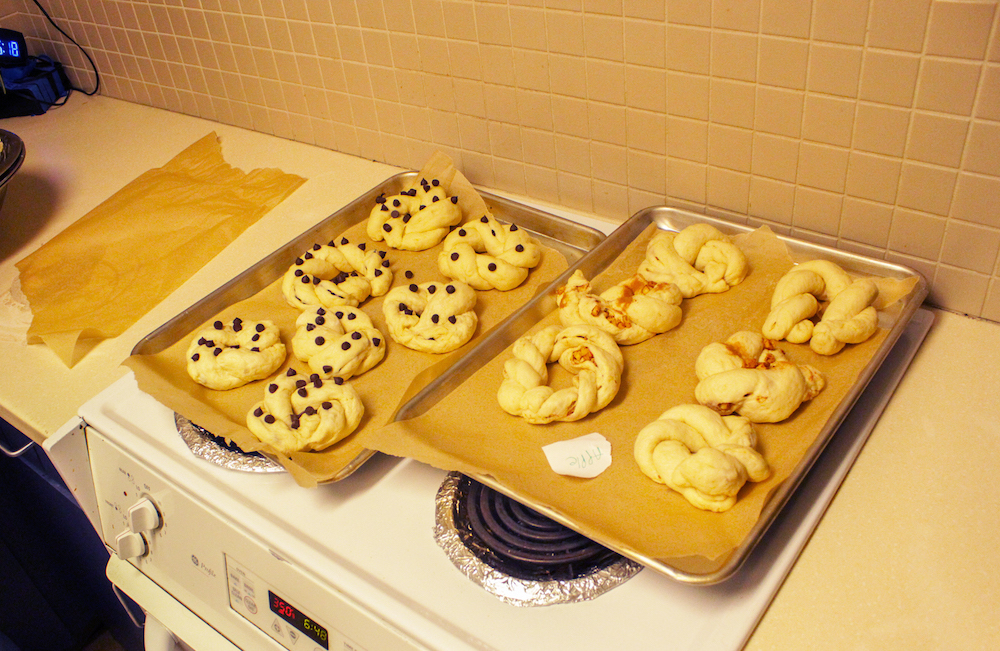
Members of Occidental’s Challah for Hunger chapter braided challah in the Wylie common room as part of the club’s mission to address food insecurity Nov. 14. According to a Dec. 2017 study from the Global Food Initiative, 44 percent of students in the University of California system experience some form of food insecurity. Hannah Rice (junior), Challah for Hunger president, said she believes this figure is about 20 percent at Occidental.
Occidental’s chapter will participate in national student-led efforts Nov. 18–22 to fight food insecurity on college campuses as part of the Campus Hunger Project. Occidental’s chapter, along with chapters across the country, will be holding educational events, according to Rice. Rice said she created a campus resource guide to provide students experiencing food insecurity with information on where they can find free or cheap food locally. She created a QR code linking to the resource PDF and put information on napkin holders in the Marketplace.
Rice said her goal as president this year is to make Challah for Hunger’s role on campus more prominent. According to Rice, Challah has done a few events beyond baking bread — the main focus of the club in previous years. The organization hosted a speaker event with their partner Food Forward, a non-profit that prevents food waste by connecting surplus fresh produce with people in need. The group will also have a social media campaign next week for the Challah for Hunger Awareness week, according to Rice. Rice said she hopes to find new ways to address food insecurity.
“At the Food Justice Fair, we did public comments against food stamp cuts. We had 40 Oxy members sign comments. We also did napkin holders with information about food insecurity,” Rice said. “Next week we’re going to have a resource by the Homestyle station [in the Marketplace] about food insecurity. I’m hoping to get time to table to answer questions about food insecurity.”
According to Junlica Meng (senior), outreach coordinator of the club, the more students volunteer their time, the more bread can be made and sold. Meng said the funds will go partially to Challah for Hunger national and partially to their local charity, Food Forward.
According to Rice, Challah for Hunger is going to continue working with Food Forward next semester.
“My goal for this year is to get some sort of working group where either it’s organized through a Facebook group or an email, where students can be notified of free food,” Rice said. “This will let them know where there are campus events with free food for students who don’t have enough money to buy dinner every night.”
According to Irene Li (junior), supply manager of the group, she gets all of the supplies they need to bake from Target. Li said the kinds of challah the group is offering this month are plain, matcha, cinnamon sugar, chocolate and apple pie.
“I joined Challah for Hunger because Hannah invited me and she said, ‘It’s just kneading bread, it would be good for helping with your anxiety,’” Li said. “It was really de-stressing for me.”

The group has served an important cultural purpose for her and others, according to Rice.
“I was raised culturally Jewish, so I’m not super religious,” Rice said. “I wanted to find something more focused on the cultural aspect [of Judaism], so that’s how I found Challah for Hunger. Baking with friends and family has always been important to me.”
Aliya Fang (sophomore), vice president of the club, said she took “Intro to Public Health“ with public health professor Jane Schmitz last year, which taught her about how food waste is an issue in developed nations and inspired her to join the club.
“Food distribution is the problem, not the amount of food because technically we could take all the food that’s going to waste and distribute it correctly,” Fang said.
Rice believes Occidental’s Challah for Hunger can play a significant role on campus combating food insecurity.
“There’s still no resources for [food-insecure students] on campus except for emergency loans, which you have to pay back,” Rice said. “I want to create a space where they can get that without long-term repercussions.“
Rice said Occidental has fewer food-insecure students than the California average, but they are still a high percentage of the population. According to Fang, since Occidental is a private institution where a lot of students are affluent, there is a stigma concerning food insecurity.
“The stigma is, I shouldn’t say ‘I don’t have money,’ and I shouldn’t show I can’t afford things, because we are surrounded by a fairly affluent population that doesn’t have to think twice about where they’re getting their next meal,” Fang said.
Fang said breaking that stigma and discussing food insecurity is a crucial first step.
“Raising awareness is our goal for next week,” Fang said. “Once the conversation has been brought to the table, then we can start making progress.”
![]()






























